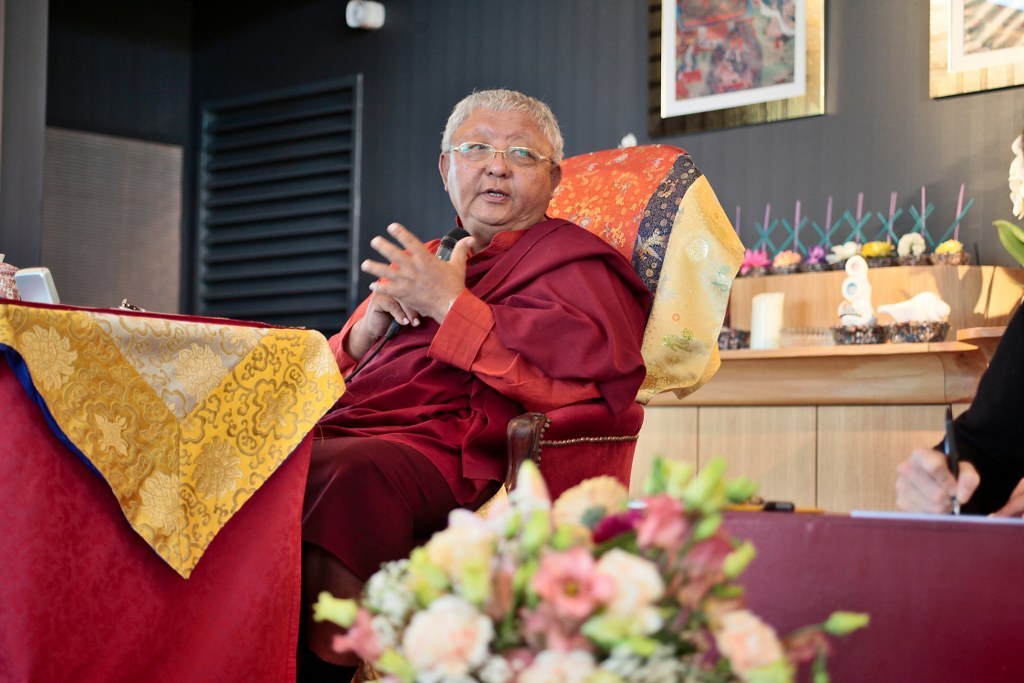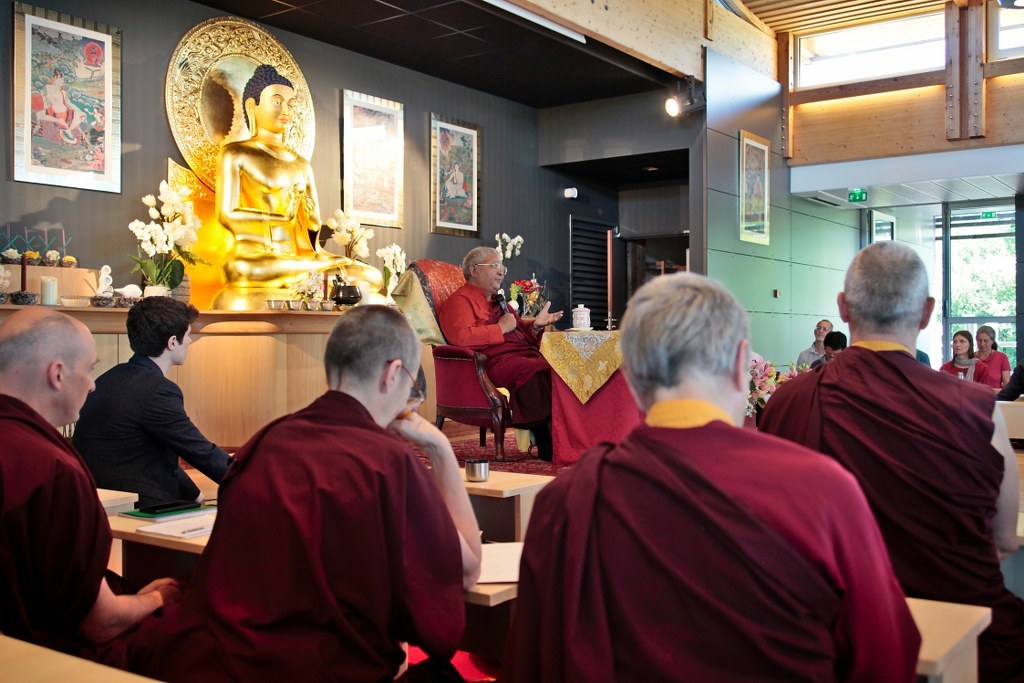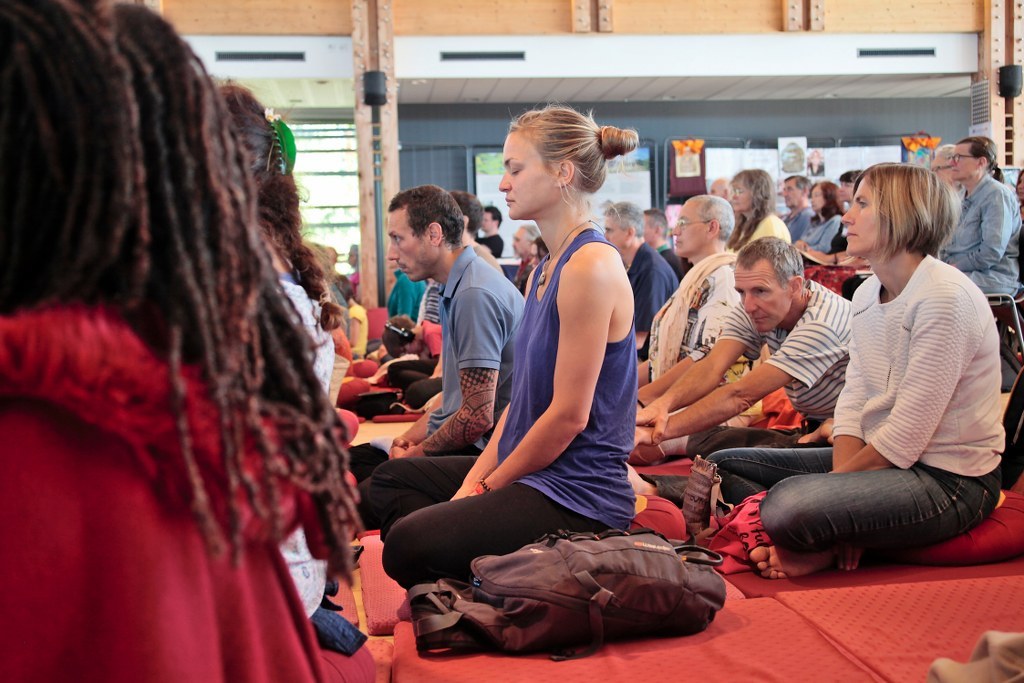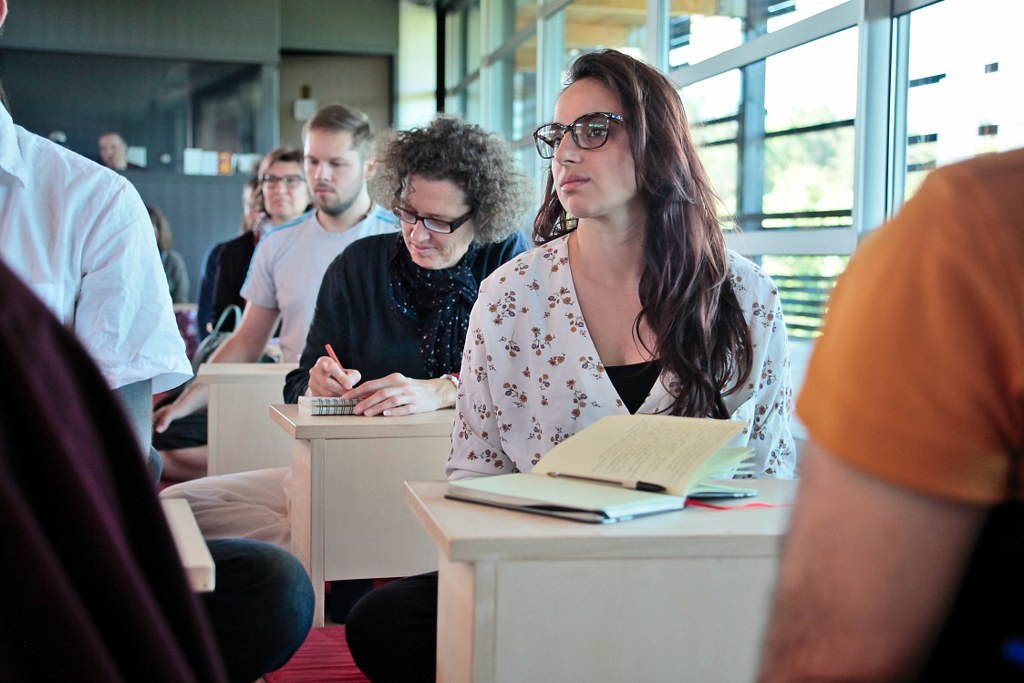Relaxation, meditation, attachment and compassion
During the four days of teaching in May, Jigme Rinpoche offered instructions in three dimensions: the meaning of meditation, attachment as a source of our difficulties and enlightened mind as the most adapted response to our situation. To combine these three facilitates life and clears the way to liberation. This chronicle is a mosaic of excerpts that seemed to be the most useful to share, with unique examples that only Jigme Rinpoche has the secret.
The teaching of the Buddha is not black and white, it cannot be reduced to good and bad, and it is not made up of “you must” and “must not”. The Buddha starts from our circumstances. Having understood our situation, he searched for what would be beneficial to put into practice. Or it can be said, it is about knowing how to face the problems that we encounter. It is like hiking in the mountains: without good shoes and a hat to protect your head, it will be difficult. Of course we can hike the trail in flip-flops with our head uncovered, but we take quite a few more risks. It is about knowing what will make life easier.
A story: one day, the Buddha asked a group of doctors to go collect medicinal plants. They all came back with samples except one who came back empty handed. The Buddha asked him why he didn’t bring anything back. The response of the man was clear: because all of the plants are good for something, even poison can heal, but one must know how to use it. So that is what this is really about: to know how to face problems that we encounter.
Meditation and gentleness
When we speak about meditation, we think method: the bodily posture, the breath as a support, correcting defects, etc. But the method is not just the method; it is there to guide us somewhere. The method alone without a good state of mind can only give limited results. It permits one to realize his goal, but it is not the goal. Moreover, by putting a method to work always supposes that several aspects are combined. If we want to taste a good coffee, it is not enough to just put some coffee beans in our mouth and we’ll get the taste. It also takes hot water, maybe some milk and sugar, and by mixing it all together we obtain the sought after taste.
Meditation is therefore first and foremost a state of mind. It is about remaining in the natural process of the mind, just being conscious of what is going on. It is not a fabricated state, or the rejection of any part of the mind. To meditate consists of remaining lucid in the natural state. We have to know how to proceed in order to abide in this state of ease and to understand what that means. The first condition is to cultivate a state of relaxation that is both physical and mental; that will help us remain in the natural state. To find this relaxation, it takes a little space: at home, we always have something to do whether it is the computer, the kitchen or elsewhere. Daily concepts bombard us and the natural state of the mind escapes us. This shows the lack of inner space. It is about being able to sit calmly and let the natural state establish itself.
Relaxation allows us to not let our habits take over. We can then experience the mind which remains, the movements of the mind that change and the consciousness of one and the other. The mind is present to itself, whatever the state of mind. Rinpoche adds, “We hear these explications, on the basis of relaxation, we apply the method. We concentrate on remaining relaxed. This is what gives rise to gentleness.”
Enlightened mind and relaxation
We cannot render a rock malleable, even it we put it in water. Without enlightened mind, we remain rigid. Bodhicitta is neither a Buddhist obligation nor a Dharma rule. It speaks to us, about us: if we want to dissipate the problems and difficulties that we encounter, then the practice of bodhicitta becomes evident. Putting enlightened mind to work generates a new vision of others, it matures the mind in a beneficial manner and it opens us up to profound relaxation. In the end, suffering diminishes; it is no longer a burden because we understand it better. Rinpoche bases bodhicitta on the practice of authentic and original love and compassion; it is not about sentimental love or emotional compassion.
We speak about authentic and original because compassion is already present in us. It is about developing our own qualities, because our nature is compassion. It is about starting with ourselves: observing our mind, we recognize the problems and the difficulties. We understand that love is just a response to our situation. By going deeper into ourselves, perceiving our states of mind, we understand that love and compassion is a resource to break-out of our confusion. First we think about developing these qualities for others, but we realize that our capacity to help is still limited. As a first stage, it is for ourselves that we cultivate compassion towards others. It is a long process. The Buddha always proposes a deeper transformation by accessing the real causes, otherwise our practice is like taking an aspirin, and we have to find a solution to each problem and it is endless.
Attachment and just seeing
By using the teachings as a basis, we can understand what attachment means. Attachment is neither good nor bad; it arises. It is not inherently bad, but through it we encounter many problems. Our first reaction is to want to detach ourselves, but that is not the right way! Instead, it is about liberating from attachment. If we are conscious of our attachments, then our vision naturally changes.
Example: Someone verbally attacks me. Immediately, I am unhappy. If I look within myself for the cause of my unhappiness, I will see that it is about pride and attachment. It is not a reason to accept the insult, but it makes me aware of the process that it generates. If I recognize it, then my vision changes. If I directly perceive my reaction and the emotions that flow from it, the insult naturally generates less suffering. It is the fact of seeing attachment as a source of confusion that allows us to change our state of mind. This is when bodhicitta can take place. It doesn’t make us good or kind, conforming to some image; it allows us to deeply change our states of mind. It does not demand any sacrifice, it leads us to better understanding the needs of others since we more deeply know ourselves with ever increasing clarity. And that is what is kind.
Puntso, program director for Dhagpo




